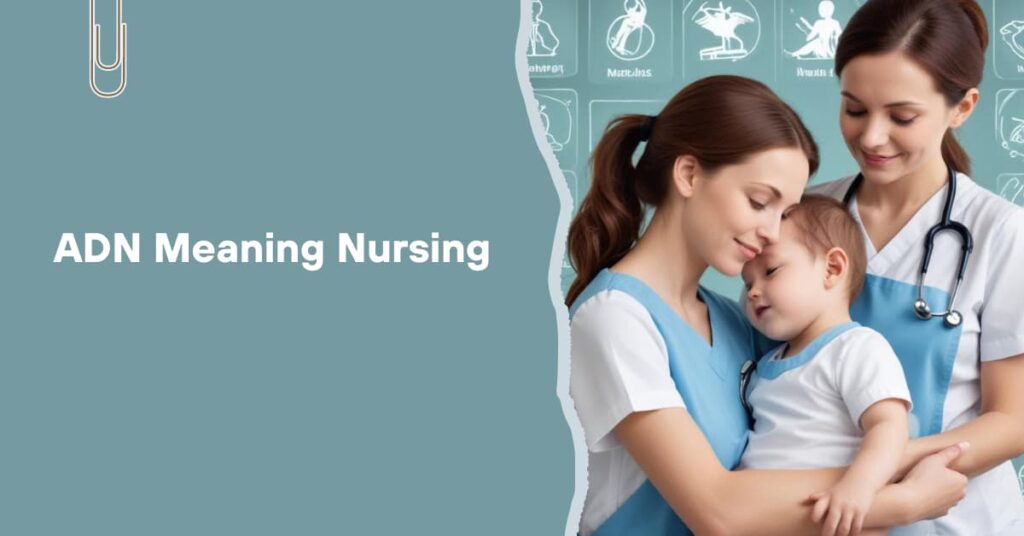Many people choose nursing because it combines science, empathy, and its far-reaching effects on society. If you are looking for a convenient way to start your nursing journey, an ADN is just what the doctor ordered. However, what exactly is an ADN? It represents an Associate Degree in Nursing and is one of the most popular routes to become Registered Nurses (RNs) among those who wish to spend less than four years in school. This two-year course can open several nursing doors and be a good foundation for your medical profession.
This article will show what ADN nurses do and how you can become one. We will also look at the duration of ADN programs, the available career prospects, and why choosing an ADN may be right for you. Whether you are a high school student planning your future or someone considering a career change, being knowledgeable about ADN nursing could assist you in making an informed choice regarding your path in healthcare.

What do ADN nurses do?
Table of Contents
ToggleHealthcare settings are only complete with ADN nurses. These are also called Registered Nurses with an Associate Degree in Nursing. They have various responsibilities, including caring for people at the bedside. A day in the life of an ADN nurse involve following things:
- Measuring vital signs like heart rate and temperature
- Administering medication that medical doctors have prescribed
- Assisting patients with everyday activities, such as showering or eating
- Explaining to patients and their relatives what various procedures entail
- Writing detailed notes on patients’ health records and treatments
- Helping doctors during examinations as well as treatment procedures
- Watching out for any alterations in a patient’s condition
- Offering emotional assistance to patients together with their families
ADN nurses can work in different settings, such as hospitals, clinics, nursing homes, and schools. Some specialize in areas like pediatrics, emergency care, or geriatrics. The position requires both technical skills and a caring attitude.
These nurses are critical members of the healthcare team. They act as intermediaries between patients and doctors, ensuring that everyone gets the required medical attention. ADN nurses are always prepared for tasks such as pain management, patient education about their health condition, or methods of infection prevention.
In summary, ADN nurses do more than just “nursing.” They are care providers, teachers, and supporters combined in one person. This job is tough, but for many people, it is also rewarding.
How do you become an ADN nurse?
A Step-by-Step Guide
Starting a career as an ADN nurse is like going on an adventure. Here is what you need to do:
1. Finish Your High School Education
After graduating from high school, your journey towards nursing begins. Focus on:
- Scientific subjects such as biology and chemistry
- Mathematics courses, especially algebra and statistics
- Health and anatomy classes, if available
Excellent marks in these subjects will give you a good base for your nursing studies.
2. Investigate and Select a Certified ADN Program
Search for schools that:
- Are sanctioned by the state board of nursing in your state
- Have great NCLEX-RN success rates
- Offer clinical opportunities in different healthcare facilities
Sometimes, community colleges offer cheap ADN programs, while some universities do.
3. Apply and Register for Your Chosen Course
Usually, the application process involves:
- Submission of transcripts and test scores
- Writing of personal statements
- Providing referees or recommenders for testimonials to be written about you as an applicant.
- Subsequent completion of minimum course requirements if there are such.
If feasible, apply to several institutions since some admissions are selective or have waiting lists.
4. Fulfill Your ADN Coursework Requirements
What will I learn during the two-year program at college?
- Anatomy & Physiology,
- Microbiology,
- Pharmacology,
- Fundamentals of Nursing,
- Mental Health,
- Maternal & Child Health Nursing –
Expect various learning methods, including classroom lectures, laboratory work, and clinical placements.
5. Get Real-Life Experience through Clinical Rotations
One must have clinical rotations as a basis for becoming an ADN nurse. You will:
- Work in various healthcare settings
- Learn to perform nursing tasks under supervision
- Interact with real patients
- Apply classroom knowledge to real-world situations.
6. Pass the NCLEX-RN Exam
The National Council Licensure Examination (NCLEX-RN) is required for all graduates who want to become licensed Registered Nurses. This computer-adaptable test includes:
- Safe and effective care environment
- Health promotion and maintenance
- Psychosocial integrity
- Physiological integrity.
Thoroughly study, and consider doing prep courses or practice exams.

7. Obtain Your State Nursing License
Every state has its own rules for licensing; however, you will generally need to:
- Give them your ADN diploma and scores from the NCLEX-RN examination;
- Pay the licensing fees;
- Pass the background check.
Some states may have extra demands; therefore, contact your nursing department.
8. Start Your Career as an ADN Nurse.
Having received the license, you can now apply for any nursing job within different sectors:
- Hospitals
- Clinics
- Long-term care facilities
- Home health agencies
- Schools
It demands dedication to be a nurse with an ADN, but it is worth it because that is how you get a healthcare career. If you are interested in working at a busy hospital or quiet clinic, consider having an Associate Degree in Nursing.
How Long is an ADN Program?
The ADN program usually lasts about two years, making it an expedited way to nursing. It permits students to join the field sooner than they would have done in a four-year program. Some institutions also provide accelerated programs where motivated students can finish them within less than eighteen months.
For two years, students learn the rudiments of nursing and participate in practical clinical activities. These may comprise subjects such as human anatomy, physiology, nursing skills, and patient care basics. Through this combination of theoretical knowledge and practical training, individuals become prepared for becoming actual nurses.
The duration might differ depending on full-time or part-time options chosen by learners. Other students complete earlier because they have previously earned credits from other colleges or taken summer courses. Many people consider the ADN path the best route to their fast start in nursing careers.
5 Things to Know About ADN Degrees
Fast Entry to the Nursing Profession
Usually, it takes two years to complete an ADN program. This means you can kick-start your nursing career much sooner than someone who spends four years in school. Many students opt for this route to get into employment and earn earlier.
Affordable Education
Bachelor’s degrees usually cost more than ADN programs. Therefore, these courses are affordable for those aspiring to join nursing. You can start working without accumulating many student loans.
Very High Demand
There is always a demand for nurses everywhere. Job prospects for registered nurses with ADNs also look bright. Hospitals and other healthcare facilities frequently hire ADN nurses for various roles.
Strong Base for Further Development
The knowledge and skills capacitated by an ADN form a solid underpinning of nursing practice (Kaplan et al., 2017). It helps one prepare for the NCLEX-RN exam, which must be passed before being licensed as a nurse (Weiss & Tappen, 2015). If one opts to continue their education, this degree serves as a leapfrog.
Different Career Paths
With an ADN, you can work in a variety of healthcare environments. Hospitals, clinics, nursing homes, and home health agencies employ ADN nurses. Some travel nurses are even called ADN nurses, working in different countries.
Career paths after earning an ADN
An ADN degree offers several exciting career options in nursing. Let us look at some of the most common paths for ADN registered nurses:
- Public health nurse
Public health nurses work to improve the community’s health by giving immunization injections and teaching health classes. Those with an ADN in public health nursing can seek employment with government agencies, community health centers, or other options. Public health nursing is a great opportunity for ADN holders to influence population-level health.
- Charge nurse
Charge nurses head teams of nurses in hospital wards. They ensure that daily operations go smoothly and that the patients receive good care. Leadership ability and experience in this area are mandatory, however. After several years of practice as an ADN nurse, many can join their colleagues as charge nurses.
- Home health nurse
A home health nurse visits patients in their homes. This nurse provides patient care, administers medication, and educates patients on how to manage their own health conditions. This job suits ADN nurses who prefer independent work and long-term relationships with patients.
- Intensive care unit (ICU) nurse
A home health nurse visits patients in their homes. This nurse provides patient care, administers medication, and educates patients on how to manage their own health conditions. This job suits ADN nurses who prefer independent work and long-term relationships with patients.

FAQs
What does ADN stand for in nursing?
The ADN is an Associate Degree in Nursing, and it takes two years to complete the program in order to qualify as a Registered Nurse. This degree is developed with an emphasis on vital nursing skills and knowledge. An ADN usually takes less time than a Bachelor’s degree, which makes it more affordable. It provides a quick start into nursing with room for advancement later.
What is the role of ADN?
Nurses in ADN provide direct patient care. They evaluate patient conditions, distribute medications, apply treatments, and give information to patients and their relatives. ADN nurses are employed in hospitals, clinics, and nursing homes to ensure that patients are well taken care of.
Is an ADN Worth it?
It is worth going for ADN. Unlike BSN, the program’s duration is approximately two years, which takes longer than that, thus making it a cheaper and faster option. With an Associate Degree in Nursing (ADN), you can sit the NCLEX-RN examination and start working as a Registered Nurse since there is a high demand for nurses. This degree grants you a firm base for a stable and fulfilling nursing profession.
Bottomline
The Associate Degree in Nursing (ADN) is a practical and efficient means of becoming a Registered Nurse. This course provides basic nursing education and practical experience within two years only. It introduces learners to different nursing opportunities and allows for more academic qualifications and professional growth.
Going through an ADN program can be a wise idea for those in a hurry to start practicing nursing. ADN provides a strong background in nursing and sets you up for the NCLEX-RN examination. Good job prospects and potential higher degree options make it a worthwhile investment into your future.

